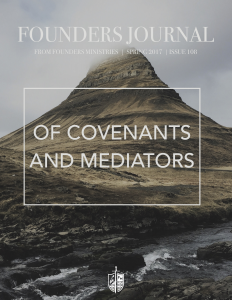In proclaiming the superiority of Jesus Christ to all types, shadows, ceremonies, and preparatory operations, the writer of Hebrews says that “Jesus has become a surety of a better covenant (Hebrews 7:22 NKJV). Soon after, the writer says, in comparison to the high priest of Jewish ceremony, “But now He has obtained a more excellent ministry, inasmuch as He is also Mediator of a better covenant, which was established on better promises” (Hebrews 8:6 NKJV). In Christ therefore, we find the surety for all that was promised and typified in the old covenant, thus giving substance to the shadow and fulfillment to the promise through the final realities conveyed in the New Covenant. We find in Jesus also the perfect mediator of the “better,” this new, covenant. This is in fact the unfolding of all the provisions of the “eternal covenant” in which the Father gave a people to the Son and provided all the means by which that people would be drawn to the Son, would live and reign with Him forever in the full enjoyment of God. The Father grants the people, the Son purchases them by redemption, and the Spirit unites them to the Son in that redemptive work. As Prophet, Priest, King and Chief Shepherd, Jesus has fulfilled everything; the redemptive work is done, all things are under his feet, and he awaits the calling of his final purchased one, and then will descend from heaven with a shout. The writer of Hebrews finalizes his argument with a benediction: “Now may the God of peace who brought up our Lord Jesus from the dead, that great Shepherd of the sheep, through the blood of the everlasting covenant, make you complete in every good work to do His will, working in you what is well pleasing in His sight, through Jesus Christ, to whom be glory forever and ever” (Hebrews 13:20, 21).
This biblical emphasis sets the stage for chapters VII and VIII of the Second London Confession. Entitled “Of God’s Covenant” and “Of Christ the Mediator,” these two chapters bring together a synthesis of the covenantal theology of Scripture and demonstrate how vital and central Christ is to the complete fulfillment of all the covenantal provisions. Chapter VII speaks of the “Eternal Covenant transaction, that was between the Father and the Son about the redemption of the Elect.” Chapter VIII begins by affirming that Jesus Christ as the mediator of this covenant, as prophet, priest and king for the people “to be by him in time redeemed, called, justified, sanctified, and glorified.” The chapters are concerned to give a precise, clear, faithful, and encouraging statement of the biblical themes of covenant and Christ and to show that the salvation of the sinner is most assuredly in Christ alone. Christ alone is the person in whom such redemption could take place, and Christ alone is the person who has done all that should be done—“in whom we have redemption through his blood, the forgiveness of trespasses” (Ephesians 1:7).
Three writers tackle the chapter on covenant. Fred Malone, Jeff Johnson, and Pascal Denault—all serious pastor theologians—make excellent contributions on this subject. Each of these has written a book on covenant theology. In this issue, they give a concise, doctrinally clear, and energetic treatment of this vital theme of biblical theology. The effect is, in my judgment, quite bracing. The clarity of the confession in bringing forth from three different writers such affirming unity could, on a very personal level, make one shout for joy. The approaches governed by the three personalities and ministerial orientations show the freshness and abiding relevance of the doctrinal themes within this subject.
Justin McClendon, an instructor in theology at Grand Canyon Theological Seminary & College of Theology has written three articles on chapter VIII. He gives a robust treatment of the confession in its emphasis on the person, work, and offices of Christ. He applies this doctrinal treatment then to its relevance as a model for pastoral ministry. His presentation is vigorous and Christ-honoring.
Our prayer is that each reader of this Journal will be edified and more thoroughly prepared to do works of service to Christ the King by contemplating the truths resident in this soul-enlarging subject.
—Tom J. Nettles





















